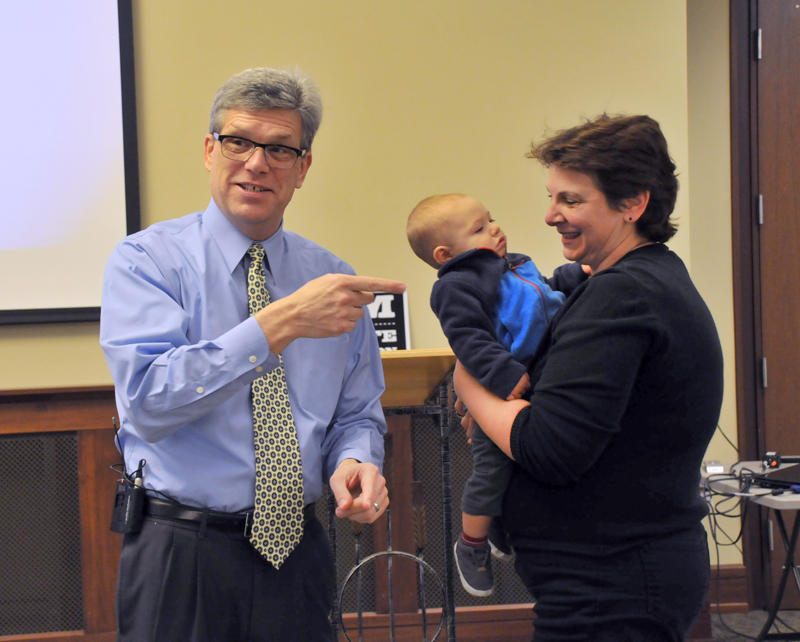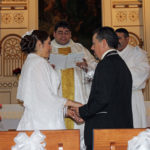By Lindsay Steele
The Catholic Messenger
IOWA CITY — Many of the most common pro-life defenses fail to hold up in a debate, said Scott Klusendorf, president of the Life Training

Scott Klusendorf, left, president of the Life Training Institute, joins Bonnie Mattaliano, a member of St. Mary Parish in Solon, in a mock debate during Klusendorf’s presentation, “Pro-Life: Equipped and Engaged.” Klusendorf offered the presentation at St. Patrick Parish in Iowa City on March 25.
Institute and author of “The Case for Life: Equipping Christians to Engage the Culture.”
“People say that if abortion were available 300 years ago then Beethoven could have been aborted,” but this argument unintentionally focuses on talent and level of development as indicators of a human’s worth, Klusendorf said during a March 25 presentation at St. Patrick Parish. His talk was titled “Pro-life: Equipped and Engaged.”
Another common pro-life argument is that women regret having an abortion; pro-choice advocates, however, are quick to point out that argument isn’t always true, he continued. Additionally, identifying developmental milestones — such as when a fetus’ heart begins to beat or when he or she begins to feel pain — unintentionally takes the focus off the fact that humanity begins at conception.
To make a solid argument, Klusendorf said, pro-life advocates must focus on the following message: abortion intentionally kills a human being, and a person’s humanity is established at the moment of conception. Therefore, abortion is wrong. Armed with this “laser-focused” message, pro-life advocates have a higher probability of planting a seed of doubt in a pro-choice advocate’s mind.
Klusendorf said he has become familiar with common pro-choice arguments and rebuttals in his work. At one point during his presentation, he played the role of an avid abortion supporter. He challenged audience members to try to change his mind, all the while attempting to throw them off their path.
He argued that the pro-life message can compete in the marketplace of ideas if properly understood and articulated. Centering on the basic message can help pro-life advocates focus an argument through a number of objections, including those related to the idea that humanity is determined by size, level of development, environment or degree of dependency. Klusendorf said, “Humans are equal by nature, not function. Although they differ immensely in their respective degrees of development, they are nonetheless equal because they share a common human nature — and they had that human nature from the moment they began to exist.”\Klusendorf said pro-life advocates will benefit from being aware of five bad ways critics argue about abortion:
• They make assumptions, arguing that abortion should remain legal since people will find ways to get abortions anyway — perhaps dangerously. Pro-life advocates should refocus the argument on the humanity of unborn children. Just because people may choose to have an abortion, doesn’t make it right.
• They attack pro-life advocates rather than arguing the merits of their point. Responses should focus on the unjust killing of an innocent human being, and not the flaws of people speaking the pro-life message.
• They assert rather than argue that women have the right to choose. The response should be: “Where does that right come from?” The unborn child is human, so what gives one person the right to take another human’s life?
• They confuse functioning as a human being with being one. Klusendorf said, “It is far better to argue that although humans differ immensely in terms of characteristics, they share a common human nature.”
• They hide behind the hard cases, such as rape or risk to the mother’s health. “Ask: How should a civil society treat innocent human beings who remind us of a painful event? Is it OK to hurt them so we can feel better?” In cases of the mother’s health, physicians can usually treat threats to the mother’s life without ending the pregnancy. Ectopic pregnancy is an exception; the physician can lose both mother and embryo, so it is better to act to save one life rather than lose two, even though the unintended and foreseeable result is the death of the embryo.
Klusendorf also spoke extensively about relativism; the concept that what’s right and wrong is up to the individual or a society to decide. Although relativism is used to silence dissent, it self-destructs upon scrutiny. The central pro-life message is much easier to prove, he said. Because secularists aren’t easily convinced by religious arguments, it is best not to focus on religion or Bible verses in a debate, he added.
Klusendorf reminded the audience that “people aren’t just going to look at you and admit that they’re wrong. … Your job is to give them something to think about, to communicate truth.”
Sarah McCreary, a senior at the University of Iowa in Iowa City and founder of the university’s Students for Life organization, said Klusendorf’s message was eye-opening. She realized the young organization hasn’t always been confident following up with pro-choice students and engaging in discussions. The presentation gave her more confidence, and she plans to share what she learned with other Students for Life members. “There are a million different situations and explanations, but only one question that is at the heart of it — is that (unborn child) a human being? Science tells us it is, which makes abortion intrinsically evil.”
Sheryl Schwager, director of Johnson County Right to Life (JCRTL), said the presentation equipped audience members with the tools and confidence necessary to defend pro-life truths. “His message and techniques will enhance our mission to educate members of our community about the dignity of all human life with clarity and compassion.”
JCRTL board member Alice Hale believes the message will be “very practical and effective in changing hearts.”











